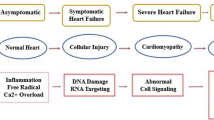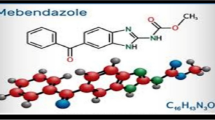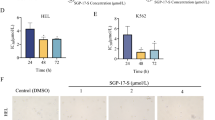Abstract
We studied the effects, either combined or alone, of lectin from Korean mistletoe (Viscum album var. coloratum agglutinin, VCA) and doxorubicin (DOX) in MCF-7 (estrogen receptor-positive) and MDA-MB231 (estrogen receptor-negative) human breast cancer cells. When VCA and DOX were combined, a strong synergistic effect was shown in cell growth inhibition, compared to VCA or DOX treatment alone. In quantitative apoptosis studies analyzed by flow cytometry, a combination of two agents showed an increase in apoptosis in both cells, compared to agents alone. Also, pro-apoptotic proteins including Bax, Bik, and Puma were increased in both cells, and the survival factor Bcl-2 was inhibited in MCF-7 cells when drugs were combined. Furthermore, VCA combined with DOX mediated S phase arrest, accompanied with a decrease of cell number at G0/G1 phase. This suggests that VCA and DOX combination may possibly lead to a novel strategy for the treatment of breast cancer.








Similar content being viewed by others
References
Büssing A, Suzart K, Bergmann J, Pfüller U, Schweizer K (1996) Induction of apoptosis in human lymphocytes treated with Viscum album L. is mediated by the mistletoe lectins. Cancer Lett 99:59–72
Hajto T, Hostanska K, Frei K, Rordorf C, Gabius HJ (1990) Increased secretion of tumor necrosis factor α, interleukin 1, and interleukin 6 by human mononuclear cells exposed to β-galactoside-specific lectin from clinically applied mistletoe extract. Cancer Res 50:3322–3326
Schultze JL, Stettin A, Berg PA (1991) Demonstration of specifically sensitized lymphocytes in patients treated with an aqueous mistletoe extract (Viscum album L.). Klinische Wochenschrift 69:397–403
Urech K, Scher JM, Hostanska K, Becker H (2005) Apoptosis inducing activity of viscin, a lipophilic extract from Viscum album L. J Pharm Pharmacol 57:101–109
Park WB, Lyu SY, Kim JH, Choi SH, Chung HK, Ahn SH, Hong SY, Yoon TJ, Choi MJ (2001) Inhibition of tumor growth and metastasis by Korean mistletoe lectin is associated with apoptosis and antiangiogenesis. Cancer Biother Radiopharm 16:439–447
Franz H, Ziska P, Kindt A (1981) Isolation and properties of three lectins from mistletoe (Viscum album L.). Biochem J 195:481–484
Peumans WJ, Verhaert P, Pfüller U, Van Damme EJ (1996) Isolation and partial characterization of a small chitin-binding lectin from mistletoe (Viscum album). FEBS Lett 396:261–265
Lyu SY, Park SM, Choung BY, Park WB (2000) Comparative study of Korean (Viscum album var. coloratum) and European mistletoes (Viscum album). Arch Pharm Res 23:592–598
Yoon TJ, Yoo YC, Kang TB, Shimazaki K, Song SK, Lee KH, Kim SH, Park CH, Azuma I, Kim JB (1999) Lectins isolated from Korean mistletoe (Viscum album coloratum) induce apoptosis in tumor cells. Cancer Lett 136:33–40
Choi SH, Lyu SY, Park WB (2004) Mistletoe lectin induces apoptosis and telomerase inhibition in human A253 cancer cells through dephosphorylation of Akt. Arch Pharm Res 27:68–76
Kasahara K, Fujiwara Y, Sugimoto Y, Nishio K, Tamura T, Matsuda T, Saijo N (1992) Determinants of response to the DNA topoisomerase II inhibitors doxorubicin and etoposide in human lung cancer cell lines. J Natl Cancer Inst 84:113–118
Hortobagyi GN (1997) Chemotherapy of breast cancer: a historical perspective. Semin Oncol S17:1–4
Sharma G, Tyagi AK, Singh RP, Chan DC, Agarwal R (2004) Synergistic anti-cancer effects of grape seed extract and conventional cytotoxic agent doxorubicin against human breast carcinoma cells. Breast Cancer Res Treat 85:1–12
Park WB, Han SK, Lee MH, Han KH (1997) Isolation and characterizaton of lectins from stem and leaves of Korean mistletoe (Viscum album L. var. coloratum) by affinity chromatography. Arch Pharm Res 20:306–312
Park WB, Ju YJ, Han SK (1998) Isolation and characterization of beta-galactoside specific lectin from Korean mistletoe (Viscum album var. coloratum) with lactose-BSA-sepharose 4B and changes of lectin conformation. Arch Pharm Res 21:429–435
Chou T, Talalay P (1984) Quantitative analysis of dose-effect relationships: the combined effects of multiple drugs or enzyme inhibitors. Adv Enzyme Regul 22:27–55
Lyu SY, Choi SH, Park WB (2002) Korean mistletoe lectin-induced apoptosis in hepatocarcinoma cells is associated with inhibition of telomerase via mitochondrial controlled pathway independent of p53. Arch Pharm Res 25:93–101
Tyagi AK, Singh RP, Agarwal C, Chan DCF, Agarwal R (2002) Silibinin strongly synergizes human prostate carcinoma DU145 cells to doxorubicin-induced growth inhibition, G2-M arrest and apoptosis. Clin Cancer Res 8:3512–3519
Hortobagyi GN (2001) Progress in systemic chemotherapy of primary breast cancer: an overview. J Natl Cancer Inst Monogr 2001:72–79
Sarath VJ, So CS, Won YD, Gollapudi S (2007) Artemisia princeps var orientalis induces apoptosis in human breast cancer MCF-7 cells. Anticancer Res 27:3891–3898
Riggins RB, Bouton AH, Liu MC, Clarke R (2005) Antiestrogens, aromatase inhibitors, and apoptosis in breast cancer. Vitam Horm 71:201–237
Quintier L, Fantin M, Vizler C (2007) Identification of molecular determinants of tumor sensitivity and resistance to anticancer drugs. Adv Exp Med Biol 593:95–100
Rabbani A, Finn RM, Ausió J (2005) The anthracycline antibiotics: antitumor drugs that alter chromatin structure. BioEssays 27:50–56
Belka C, Jendrossek V, Pruschy M, Vink S, Verheij M, Budach W (2004) Apoptosis-modulating agents in combination with radiotherapy-current status and outlook. Int J Radiat Oncol Biol Phys 58:542–554
Bouillet P, Strasser A (2002) BH3-only proteins—evolutionarily conserved proapoptotic Bcl-2 family members essential for initiating programmed cell death. J Cell Sci 115(Pt 8):1567–1574
Murphy KM, Ranganathan V, Farnsworth ML, Kavallaris M, Lock RB (2000) Bcl-2 inhibits Bax translocation from cytosol to mitochondria during drug-induced apoptosis of human tumor cells. Cell Death Differ 7:102–111
Mirza S, Sharma G, Pandya P, Ralhan R (2010) Demethylating agent 5-aza-2-deoxycytidine enhances susceptibility of breast cancer cells to anticancer agents. Mol Cell Biochem 342:101–109
Acknowledgments
This research was supported by “Establishment of Economic Technology for the Cultivation of Mistletoe and Development of Strategic Export Products Using Its Functional Compounds (project No.: 313011-3)”, Ministry of Agriculture, Food and Rural Affairs, South Korea.
Author information
Authors and Affiliations
Corresponding author
Rights and permissions
About this article
Cite this article
Hong, CE., Park, AK. & Lyu, SY. Synergistic anticancer effects of lectin and doxorubicin in breast cancer cells. Mol Cell Biochem 394, 225–235 (2014). https://doi.org/10.1007/s11010-014-2099-y
Received:
Accepted:
Published:
Issue Date:
DOI: https://doi.org/10.1007/s11010-014-2099-y




